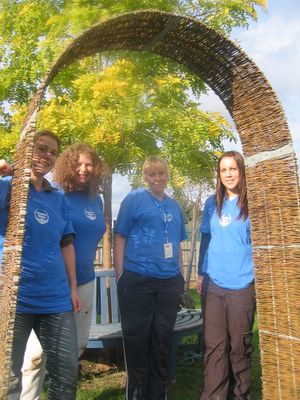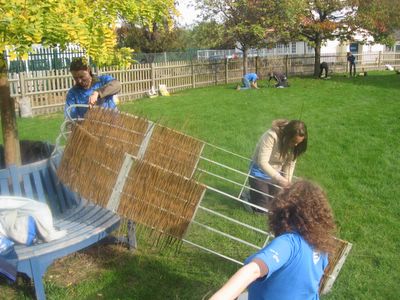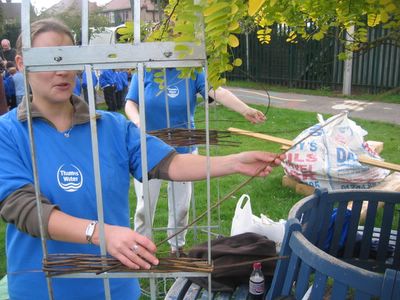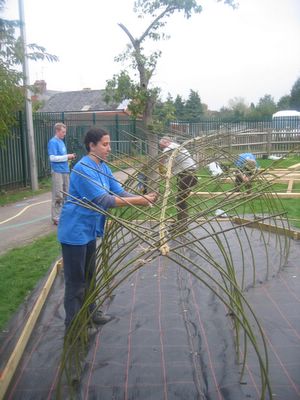Oh sorry seem to have lost some of the photos below.. not sure why. Lots of new stuff on my Permaculture at Chickenshack blog, and updates on Sector39. I have been busy since the Whitley schools project this blog talks about.. But there is lots of interesting archive stuff on here.
Growing Schools in Whitley
This is my project blog, following the development of 6 schools gardens as part of the Whitley Excellence Cluster's Aspire project, in Reading. Myself and colleague Dave are working with teachers, school governers and of course the pupils to create school gardens that are healthy, abundant and sustainable landscapes. The project started in March 2006. This is my diary of the work and I hope to encourage pupils to write their own blog for their individual garden projects.
Saturday, November 08, 2008
Saturday, June 02, 2007
View across the forest garden at GF juniors, The idea was to create a bit of a refuge from all the mayhem around, layers of taller and shorter plants, many of which are fruiting and aromatic It will take a couple of years before it really comes into its own, mean while we have added textures and vertical height with tree stups and wood chips.
Here's a view looking down, its still early spring and many of the plants are only just beginning to show them selves
Rustic Furniture, made on the Chickenshack permaculture course, not part of our schools work currently, but I would like to involve more craft work such as this in the projects. It is very satisfying making simple fun furniture for the garden
We have worked with several different sets of volunteers over the project. Doing their bit for the community, on day release from their normal jobs. What struck me was the sheer amount of skills and talents there is out there, in the drivers and delivery people, office workers and personel officers, who don't normally get a chance to be creative with their hands. A joy to work with!
Soak away/Mulch pit for a water tank. The idea here is the where there will be a big water storage tank, it can over flow into a pit, to encourage water to soak into the compacted clay ground. we will plant bamboos around here, which will enjoy the damp conditions
Here is our secret to establishing gardens on tired compacted school grounds. A thick straw mulch, with a rich compost. It blankets out all the weeds/ grass, and the worms really get going and eat everything, leaving the soil clean and fed and ready to go with a new set of plants and a new lease of life, This cross section was 10 months ago a 12" thick layer of straw and compost, on top of brick hard ground. The straw is now well broken down and the soil is moist and full of worms and other signs of life
More of the wonderful volunteer team from John Lewis' who helped out on the Reading Girls School garden. The bed behind them is planted up with fruit trees and climbers that we hope to to eventually cover that stark bare wall behind them
Here are the lads from the same team
Here another typical school landscape. Rather stark bare walls, and well trodden, not particularly cared for ground. The aim is to bring some beauty and life in such corners as thee and turn a bit of dead ground between the gym and laundry and sports ground into a little haven of its own
Sunday, January 14, 2007
We have really concentrated on propagating a lot more plants this year, so we have a big selection to plant out around the garden. This way we can take a few more chances on where we put them. Plus having the scythe means we can keep bracken and nettles under control a lot more, come the summer when everything goes mad. We have found sage easy to take cuttings from, and this cutting was taken in October and was ready to plant out in December. It has been mulched with woodchip, cardboard and some bog rushes.

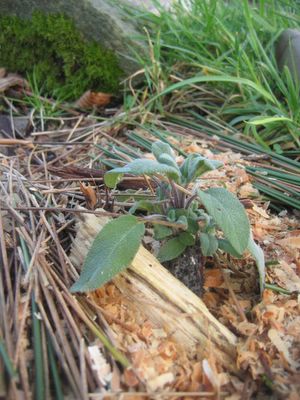
Wednesday, November 22, 2006
Here is the garden at Geoffry field juniors, its really taking shape now and we are increasingly pleased with it, the pond is still a bit of a probem however. In the picture we are half wasy through covering over the beds, the layers of compast and straw have rotted in well ow and we are closing off with cardboard and woodchip. This mulch layer will trap in the moisture and prevent weeds from getting in there before the plants are well established. Its the key with perennials if you want a low maintenance garden, is to fill up the space with the plants you do want, before the invaders can get in. All that remains now is the last few fruit trees to go in on the outer edges, those will go in over the winter sometime. The problem with the pond is that the drains from the school roofs are a bit blocked and it floods heavily when there is a rainfall - and the flood water over fills the pond and causes a bit of a lake. Now we have seen the problem we will have to try and come up with a solution when we finally finish the pond lining and planting process.


Here is the completed courtyard garden at Christchurch road infants school... the plants are hardly visible in this, but by spring it will be a riot of herbs, climbers and fruit trees. (well lets hope !) We have lifted the concrete slabs from the far side of the courtyard and replaced them with a raised bed made from oak sleepers and filled with rotted straw and elephant poo compost (!). This has been left to soak up the autumn rain and them planted into with herbs, climbers and fruiting shrubs. There will be a pear tree in the right hand corner.
The raised beds to the let and right have been treated the same way, with all those surrounding trees the soil was very dried and nutrient poor, so we have built them up and fed them in the same way. Plants include Solomon's seal, chives and perennial onions, climbing Kiwi vines, american potato bean, russian comfrey, lavender, sages and thymes, the chilean ugni bush, plus many more. We really hope the children will explore there now garden and generate an interest in some of the plants themselves.
Dave and I will be going back in the spring to fill out any gaps, and more importantly to run a teacher training session on working with the plants and ideas of how to use them.


Wednesday, October 25, 2006
Tuesday, October 24, 2006
Here is a shot of the garden at Whitley park infants and nursery school taken the following morning after the volunteer days. Its a misty dewey autumn morning, with low slanting sunlight (and hence not a great pic) of course for the full effect we will have to wait to spring. Also there are about a dozen fruit trees still to go in, but we have to wait until the plants are fully dormant before we can move them, and with the late warm weather we are having that will be at least another month or two.




